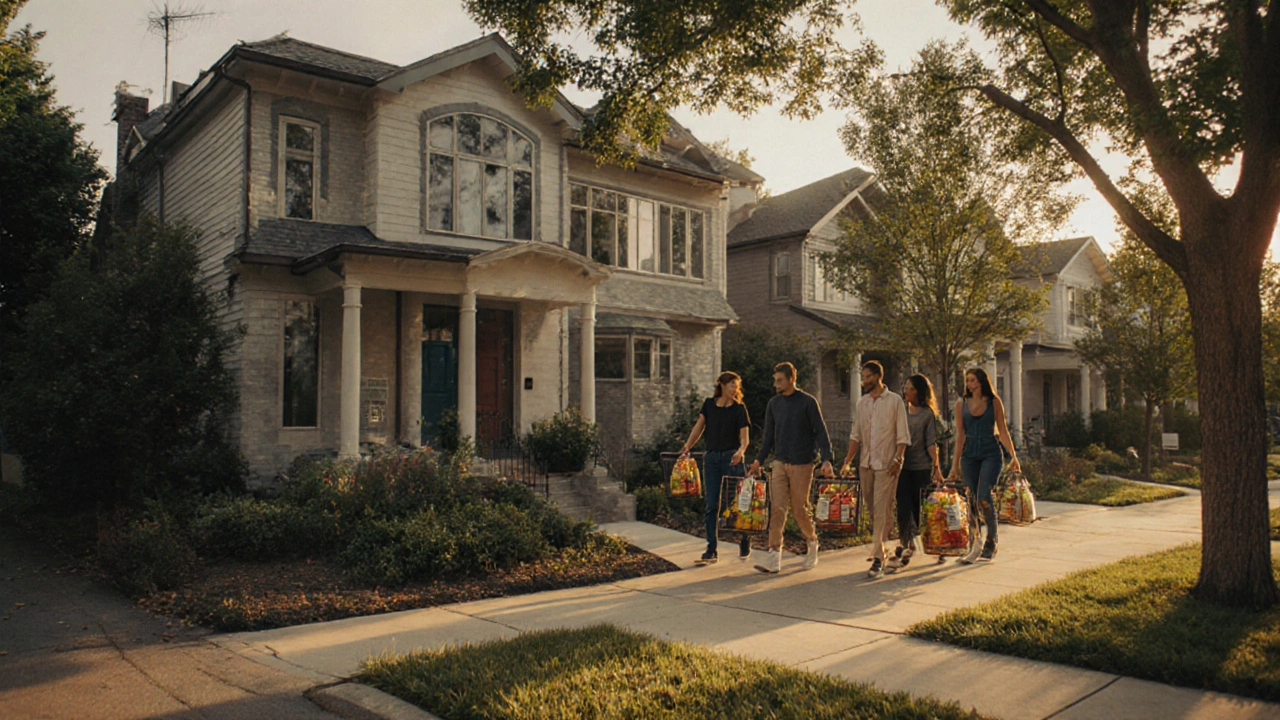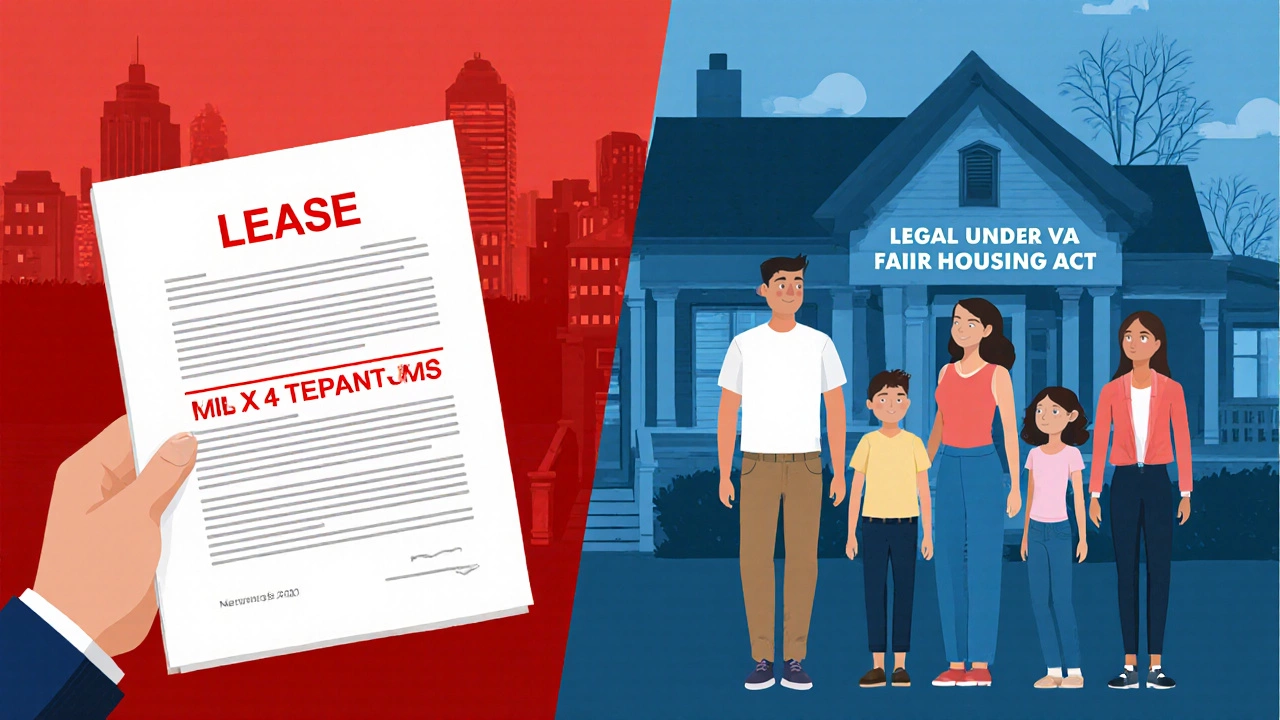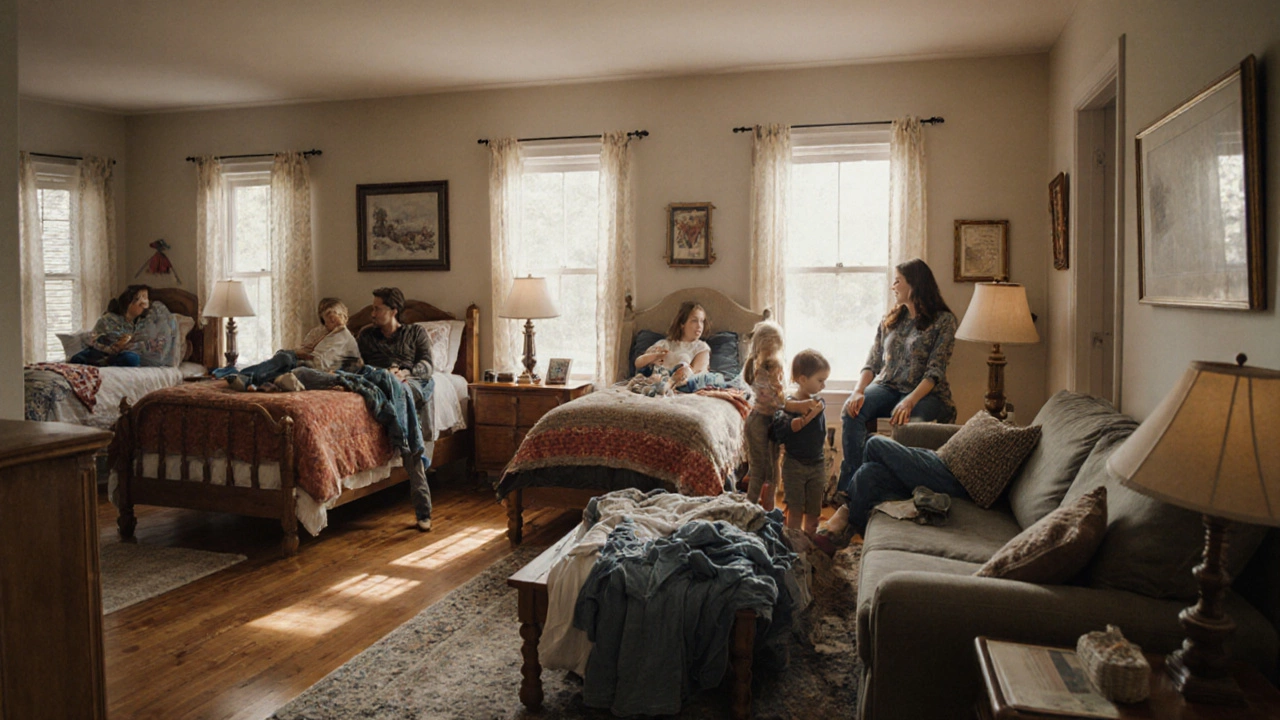Virginia Housing Occupancy Calculator
Calculate Your Housing Limit
This tool calculates the maximum number of people allowed in a Virginia home based on the two-person-per-bedroom standard and local regulations.
Your Occupancy Limit
Important Notes
This tool provides estimates based on the two-person-per-bedroom standard and common local regulations. Always verify with your local housing authority as rules may vary.
Children under 18 are typically not counted toward occupancy limits, but local rules may differ. Guests staying more than 14-30 days may be considered tenants.
There’s no single number that says exactly how many people can live in a Virginia house. It’s not like there’s a state law that says, "Four tenants max." But that doesn’t mean landlords can just let anyone move in. The rules come from a mix of local ordinances, federal guidelines, and what’s considered reasonable under housing law.
What the Federal Fair Housing Act Says
The U.S. Department of Housing and Urban Development (HUD) uses a general rule called the "two-person-per-bedroom" standard. That means if you have a three-bedroom house, you can reasonably expect to house up to six people - two per bedroom. This isn’t a strict law in Virginia, but courts and housing agencies treat it as the baseline for what’s considered fair and non-discriminatory.
Landlords who try to limit occupancy to fewer people - say, only three people in a four-bedroom house - could be accused of discriminating against families with children. That’s a violation of the Fair Housing Act. You can’t say, "We don’t rent to families with more than two kids," even if you think the house is "too small." The law protects families, not just single people.
Local Rules Vary - Check Your City or County
While Virginia doesn’t set a statewide cap, cities and counties can. For example:
- In Virginia Beach, the code allows up to five unrelated adults in a single-family home, plus children under 18. So a family of four plus two roommates? That’s allowed.
- Arlington County limits occupancy to no more than five unrelated individuals in a dwelling unit, regardless of bedroom count.
- Richmond follows the two-per-bedroom rule but adds that no more than eight people total can live in a home, even if you have five bedrooms.
- Charlottesville allows up to three unrelated people per bedroom, but caps total occupancy at 10 people.
That’s why you can’t assume what’s legal in Norfolk applies in Roanoke. Always check with your local zoning or housing department. Most city websites have a "housing code" or "occupancy limit" section under their planning or code enforcement pages.
What Landlords Can and Can’t Do
Landlords often try to control occupancy by putting limits in the lease. But not all lease clauses hold up in court.
Here’s what’s allowed:
- Setting a limit based on the two-person-per-bedroom standard (e.g., "No more than six occupants in this three-bedroom home").
- Requiring all tenants to be listed on the lease and pass background checks.
- Enforcing noise, parking, or property damage rules that apply to everyone, regardless of number.
Here’s what’s not allowed:
- Setting a blanket limit like "Maximum four tenants" in a five-bedroom house - that could be seen as anti-family discrimination.
- Refusing to rent to someone because they have children, even if the house has extra space.
- Charging extra rent per person unless it’s tied to actual added costs like utilities or trash pickup (and even then, it must be reasonable and disclosed upfront).
One landlord in Fairfax tried to charge $100 extra per month for each adult beyond two. A tenant sued. The court ruled it was an unfair practice because the landlord didn’t prove the added cost was real. The extra fee was thrown out.

What Happens If You Go Over the Limit?
If a tenant has more people living in the house than allowed by local law or the lease, the landlord can take action - but only if the limit is legal.
If the lease says "No more than four occupants" and local code allows six, the landlord can’t evict just because five people are living there. The lease clause would be unenforceable.
But if the local code says "maximum five" and six people are living there, the landlord can issue a notice to cure or quit. That means the tenant has a set time - usually 30 days - to reduce the number of occupants or face eviction.
Overcrowding can also trigger inspections. If the city finds unsafe conditions - like too many people in one room, blocked exits, or overloaded electrical systems - they can issue citations. In extreme cases, the property may be declared a public nuisance.
What Counts as a "Tenant"?
Not everyone living in the house is counted as a tenant. The law distinguishes between:
- Tenants: People named on the lease, paying rent, and legally responsible for the unit.
- Guests: People staying temporarily - like a cousin visiting for two weeks. Most leases allow guests for up to 14 consecutive days.
- Children under 18: Usually not counted in occupancy limits unless local rules say otherwise. They’re considered dependents, not tenants.
Some landlords try to count children as tenants to limit family size. That’s illegal. You can’t say, "We only allow two children per unit," even if you’re trying to keep the house "quiet." The Fair Housing Act protects families.
How to Find Your Local Rule
If you’re a tenant and want to know if your living situation is legal:
- Look up your city or county’s website. Search for "occupancy limit" or "housing code."
- Call the local building or code enforcement office. They can tell you the exact number allowed.
- Check your lease. If it conflicts with local law, the law wins.
- If you’re unsure, contact the U.S. Department of Housing and Urban Development or Virginia’s Fair Housing office for free advice.
Don’t assume your landlord knows the rules. Many don’t. A landlord who says, "I’ve never rented to more than three people," might be breaking the law.

Real-World Examples
Here’s what’s actually happening in Virginia right now:
- A family of five (two parents, three kids) lives in a three-bedroom house in Lynchburg. No one complains. The local code allows up to six people. Everything’s fine.
- A group of four young professionals rents a four-bedroom house in Alexandria. They’re under the limit. One roommate’s sister stays for a month. That’s a guest. No issue.
- A landlord in Roanoke tries to evict a tenant because their adult daughter moved in. The daughter is 22 and not on the lease. The landlord claims the lease says "no additional occupants." The tenant argues the daughter is a dependent. The court sides with the tenant - the daughter is a family member, not a tenant, and the limit was too vague.
These cases show that context matters. The law isn’t about numbers alone - it’s about fairness, safety, and protecting families.
What to Do If You’re Being Forced Out
If your landlord is trying to kick you out because too many people are living there - and you believe you’re within the legal limit:
- Get a copy of your local occupancy code. Print it out.
- Document who’s living there - names, ages, relationship to you.
- Send a written letter to your landlord citing the law and your rights.
- If they still push, contact the Virginia Fair Housing Office at 804-371-6870. They offer free help and can investigate.
Landlords who violate fair housing laws can be fined up to $16,000 for a first offense - and that’s just for discrimination. Overcrowding complaints are often just a cover for bias.
Bottom Line
There’s no magic number. It’s not "four" or "six." It’s about bedrooms, local rules, and federal protections. In most Virginia homes, you can have two people per bedroom, plus children. But check your city - some places cap total occupancy, even if you have extra space.
As a tenant, know your rights. As a landlord, know your limits. And never assume your lease overrides the law. The law always wins.
Can a landlord limit how many children live in a rental house in Virginia?
No. Under the Fair Housing Act, landlords cannot set limits on the number of children. You can’t say "no more than two kids" or "only one child per bedroom." Children are considered dependents, not tenants, and limiting their number is illegal discrimination against families.
What if I have a guest staying longer than 30 days?
If someone stays longer than what your lease allows (usually 14-30 days), they may be considered a tenant - even if they don’t pay rent. Most leases require you to notify the landlord and add them to the lease. Failing to do so could give the landlord grounds to evict everyone for violating lease terms.
Can a landlord charge extra rent per person?
Only if it’s clearly stated in the lease and tied to actual increased costs - like higher trash pickup fees or utility usage. Charging $50 extra per person just because there are more people is often seen as a way to discourage families, which can be illegal. Courts have thrown out such fees when landlords couldn’t prove the cost increase.
Is it legal to have more than 10 people in a house in Virginia?
It depends on your city. Some places like Charlottesville allow up to 10 people. Others, like Richmond, cap it at eight. But even if the number is high, if it’s within local code and follows the two-per-bedroom standard, it’s legal. The issue isn’t the number - it’s safety and compliance with local ordinances.
What if my roommate moves out and I bring in a new person?
You need the landlord’s permission to add someone to the lease. Even if the total number of occupants stays the same, the landlord has the right to screen new tenants. Refusing to allow a replacement without reason could be seen as retaliatory - especially if you’re trying to maintain the same occupancy level.
Always remember: occupancy rules exist to protect safety and fairness - not to control who lives where. Know the law, know your rights, and don’t let a landlord’s personal preferences override what’s legal.

